Feb 3, 2025 10:49 PM
The Essence of Emily
In the April 1982 issue of People magazine, under the heading “Lookout: A Guide To The Up and Coming,” jazz…
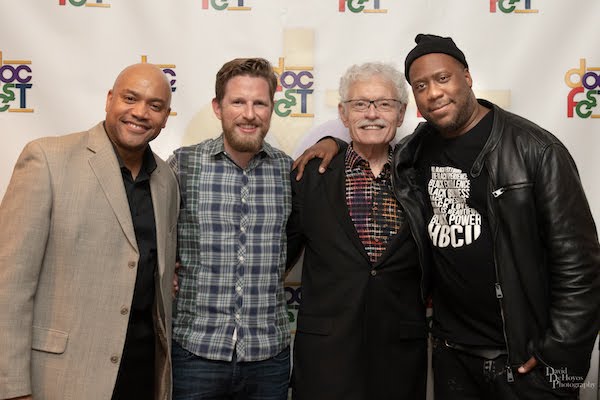
Robert “Doc” Morgan (second from right), the newest inductee in the DownBeat Jazz Education Hall of Fame, enjoys a moment with HSPVA alumni Chris Walker (left), Matt Mullenweg and Robert Glasper.
(Photo: David DeHoyos Photography)In 1976, Robert “Doc” Morgan did something extraordinary. A freshly minted Ph.D. with a tenured position at Sam Houston State University in Huntsville, Texas, he quit to teach high school.
“My friends thought I was nuts,” said Morgan, the newest inductee in the DownBeat Jazz Education Hall of Fame. “But my ‘little voice’ said, ‘Do it,’ so I did.”
Looking back over the 23 years he spent at Houston’s High School for the Performing and Visual Arts—where he taught future jazz stars like Jason Moran, Robert Glasper and Eric Harland—Morgan, now retired, doesn’t regret a moment.
Founded in 1971, HSPVA already had a burgeoning reputation when Morgan joined the faculty, and in many ways he was the ideal teacher for the school. Born in Houston, but raised primarily in Dallas, he was the son of a former professional banjo player and grew up immersed in the music of Benny Goodman and Duke Ellington.
Both Robert and his older brother Bill studied piano before taking up, respectively, trumpet and tenor saxophone. As a teen, Robert was the youngest member of the Euel Box Orchestra, the Dallas area’s most popular big band, and in his senior year of high school he held the principal trumpet chair in the Texas All-State Symphony.
“I was a good player,” he said. “In high school, I was one of the busiest gigging trumpet players around Dallas. Our dad didn’t want us to follow him into music, but when he realized he couldn’t dissuade us, he made sure we had great horns and private instruction. He also said he’d only pay for my college tuition if I agreed to get my teaching certificate.”
Determined to build a career as an instrumentalist and arranger, Morgan enrolled in what was then called North Texas State College, where he became only the second freshman trumpeter—after Marvin Stamm—to win a spot in the prestigious One O’Clock Lab Band. Insurmountable embouchure problems forced him to switch to valve trombone, but he remained focused on a career in New York until he fell in love with teaching during what he thought would be a temporary stopover at Sam Houston State.
“I was teaching classical theory and counterpoint—things that had nothing to do with jazz,” he said, “and I was surprised how much I enjoyed it. I hadn’t anticipated the joy that comes from a light bulb going on over a student’s head. It was very rewarding.”
“Doc” (Morgan’s nickname at HSPVA) was a commanding force, recalled Chris Walker, an alumnus who played bass in Ornette Coleman’s Prime Time band, and later became a producer and jazz and r&b singer.
“He demanded excellence on every level, and created a loving, competitive atmosphere, which helped all of us grow as musicians and human beings,” Walker said. “I vividly recall taking an improvisation class with Doc and predominantly seniors. I was the only sophomore and was completely lost. Doc was very patient and made sure I absorbed the information and translated it to my instrument. I went from [earning] D’s to A’s under his tutelage.”
Pianist Helen Sung was a classical student at HSPVA, but she said Morgan was impossible to miss.
“I remember being a little afraid of Doc,” she said. “He would stalk up and down the halls with his purposeful, quick gait, with what I thought was a stern and serious expression. I knew his students won all sorts of awards and played all over town, and that they all respected and loved Doc immensely.”
Sung’s experiences with Morgan since leaving high school and switching to jazz speak to his influence beyond the walls of HSPVA. She described his excitement at seeing her play at a jazz band festival at the University of Colorado.
“He came backstage,” she said, “and was so kind and complimentary. I’m incredibly touched by Doc’s declaring that his teaching must have been so effective that it reached me without me ever stepping foot into the jazz band classroom. He’s continued to be so supportive of me as my career has developed.”
While he chafes at taking credit for the success of HSPVA’s best-known music graduates, Morgan pointed to two factors that made him successful.
“One, I was a good musician, and I had figured out a lot of what I learned on my own; there weren’t a lot of books in those days,” he said. “Two, I think teaching requires a passion to help young people with this wonderful art form. I would never, never take credit for making anyone the musician they’ve become, but I do think I was able to communicate my enthusiasm and wisdom.”
Walker, who created DocFest—a nonprofit aimed at promoting further education for HSPVA alumni—in his former teacher’s honor, said, “Doc treated all of us like professional musicians, which prepared us for the real world.” DB
This story originally was published in the September 2020 issue of DownBeat. Subscribe here.
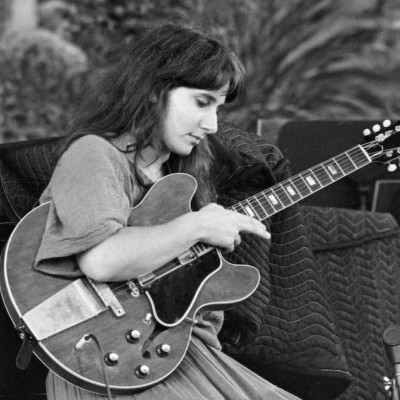
“She said, ‘A lot of people are going to try and stop you,’” Sheryl Bailey recalls of the advice she received from jazz guitarist Emily Remler (1957–’90). “‘They’re going to say you slept with somebody, you’re a dyke, you’re this and that and the other. Don’t listen to them, and just keep playing.’”
Feb 3, 2025 10:49 PM
In the April 1982 issue of People magazine, under the heading “Lookout: A Guide To The Up and Coming,” jazz…
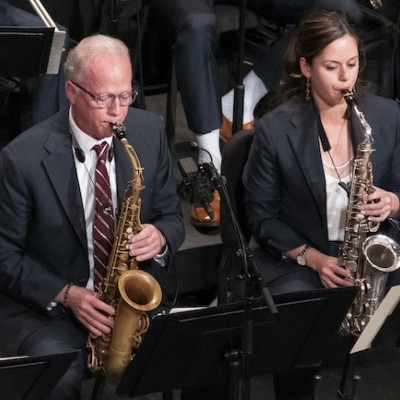
As Ted Nash, left, departs the alto saxophone chair for LCJO, Alexa Tarantino steps in as the band’s first female full-time member.
Mar 4, 2025 1:29 PM
If only because openings for JLCO’s 15 permanent positions appear about as frequently as sub-freezing days on the…
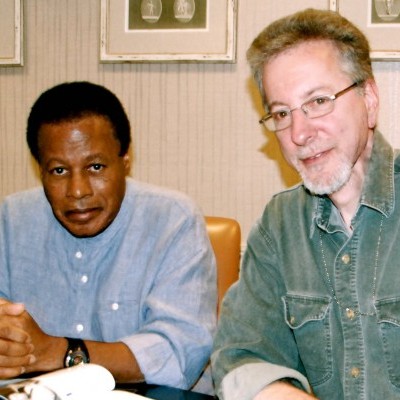
Larry Appelbaum with Wayne Shorter in 2012.
Feb 25, 2025 10:49 AM
Larry Appelbaum, a distinguished audio engineer, jazz journalist, historian and broadcaster, died Feb. 21, 2025, in…
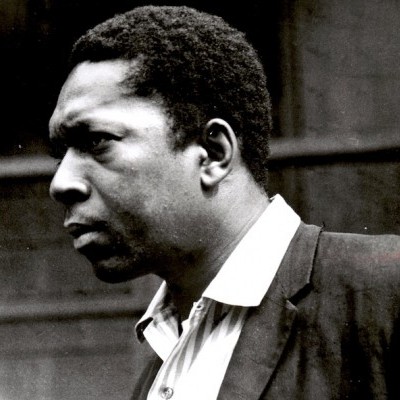
“This is one of the great gifts that Coltrane gave us — he gave us a key to the cosmos in this recording,” says John McLaughlin.
Mar 18, 2025 3:00 PM
In his original liner notes to A Love Supreme, John Coltrane wrote: “Yes, it is true — ‘seek and ye shall…
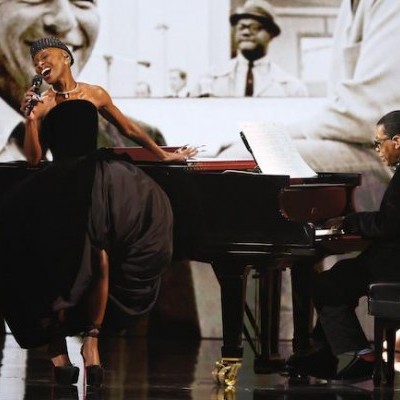
Cynthia Erivo and Herbie Hancock perform “Fly Me To The Moon” during a Grammy Awards tribute to Quincy Jones on Feb. 2.
Feb 3, 2025 10:21 PM
The jazz and blues community may not have been center stage for the majority of the 67th annual Grammy Award…